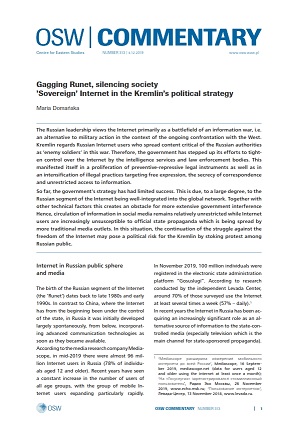Gagging Runet, silencing society. ’Sovereign’ Internet in the Kremlin’s political strategy
Gagging Runet, silencing society. ’Sovereign’ Internet in the Kremlin’s political strategy
Author(s): Maria Domańska
Contributor(s): Magdalena Klimowicz (Translator)
Subject(s): Media studies, Governance, Government/Political systems, Politics and communication
Published by: OSW Ośrodek Studiów Wschodnich im. Marka Karpia
Keywords: Russia; politics; internet; information war; political strategy; free expression; government; media;
Summary/Abstract: The Russian leadership views the Internet primarily as a battlefield of an information war, i.e. an alternative to military action in the context of the ongoing confrontation with the West. Kremlin regards Russian Internet users who spread content critical of the Russian authorities as ‘enemy soldiers’ in this war. Therefore, the government has stepped up its efforts to tighten control over the Internet by the intelligence services and law enforcement bodies. This manifested itself in a proliferation of preventive-repressive legal instruments as well as in an intensification of illegal practices targeting free expression, the secrecy of correspondence and unrestricted access to information. So far, the government’s strategy has had limited success. This is due, to a large degree, to the Russian segment of the Internet being well-integrated into the global network. Together with other technical factors this creates an obstacle for more extensive government interference Hence, circulation of information in social media remains relatively unrestricted while Internet users are increasingly unsusceptible to official state propaganda which is being spread by more traditional media outlets. In this situation, the continuation of the struggle against the freedom of the Internet may pose a political risk for the Kremlin by stoking protest among Russian public.
Series: OSW Commentary
- Page Count: 11
- Publication Year: 2019
- Language: English
- Content File-PDF

